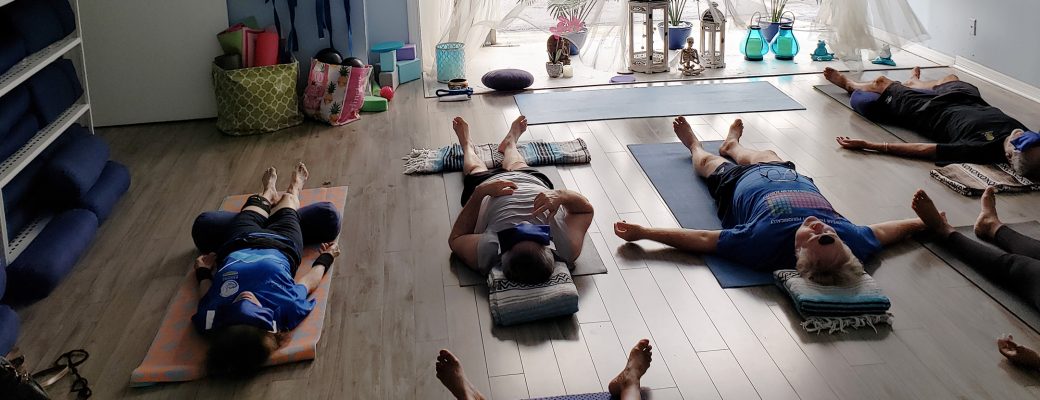December 1, 2015
Kidding Around Yoga
Researchers suggest that children under the age of 6 are developmentally less capable of:
- Thinking about an event in its entirety;
- Selecting from a menu of possible behaviors in response to any new, interesting, or anxiety-inducing event;
- Comprehending an event separate from their own feelings; and
- Modifying their physical reactions in response to change in stimuli
Zegans (1982) theorizes that stress response is experienced in 4 distinct stages:
1) Alarm then physical reaction;
2) Appraisal, as a child attempts to make meaning from the event;
3) Searching for adaptation and coping strategies; and finally
4) Implementation of a strategy or strategies.
Yoga teaches how to intervene in stages 2, 3, and 4. It creates resilience to prevent future chronic stress, heals past stress.
To children, when something bad happens, its a disaster and will last forever.
They lack sense of proportion and duration. Stress is the body’s general response to any intense physical, emotional, or mental demand placed on it by oneself or others.
Stressful:
- Racing to meet a deadline
- Dealing with a difficult person
- Earning a poor grade
Also Stressful:
- The excitement of playing a lively game
- Falling in love, (getting a crush or special attachment to another child or adult)
- Being selected to join a special program/ get an honor.
Anything can be a stressor if:
- It lasts long enough
- Happens often enough
- Is strong enough
- Is perceived as stress
School is your children’s job. Students closely link their identities to excellence and achievement. Failure, or even the perception of failure, seriously threatens their self-esteem. Academic and social pressure are 2 big stressors.
There is no way to measure the extent of childhood stress. Health officials do not gather statistics, as they do for diabetes or cancer. But there are certain indicators.
The Centers for Disease Control and Prevention reports that in 2005 a startling
- 17 % of high school students contemplated suicide in the previous year
- 8 % tried to kill themselves.
From 1980 to 1994, the incidence of asthma among 5-to-14-year-olds increased by 75 percent.
The best predictor of how a child will cope with stress is how the parents/role models cope.
Factors That Help Prevent Stress:
- Good nutrition, wellness, and exercise. Time to relax.
- Positive problem solving and coping skills.
- Close, supportive relationships at home and school, with peers and adults.
- Clear expectations.
- Permission and ability to learn from mistakes.
- Consistent, positive discipline.
- Ability to express feelings appropriately.
- Feeling physically and emotionally safe.
- Time to do recreational activities.
How Parents/Role Models Can Help
- Be aware of your child’s behaviors and emotions.
- Be available and open to talk with your child when they are ready. If family circumstances are contributing to the stress, be willing to answer questions honestly and calmly.
- Teach and model good emotional responses.
- Encourage them to tell you if they feel overwhelmed.
- Encourage physical activity, good nutrition, and rest.
- Teach your child to problem solve.
- Remind your child of his or her ability to get through tough times, particularly with the love and support of family and friends.
- Use encouragement and natural consequences when poor decisions are made.
- Help your child select appropriate extracurricular activities and limit over- scheduling.
- Make your child aware of the harmful effects of drugs, alcohol, and promiscuous sex before experimentation begins.
Adapted from: “Stress in Children: Strategies for Parents and Educators,” Ellis P. Copeland, Helping Children at Home and School II: Handouts for Families and Educators, NASP, 2004.
The full handout is available online at http://www.nasponline.org/families
